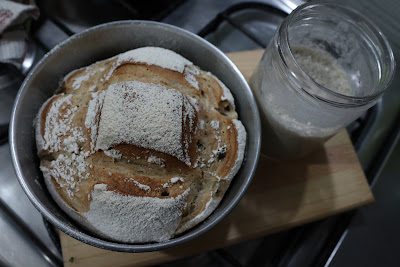Why does my sourdough bread smell like alcohol?
 |
| by pixabay.com |
I. Introduction
A. Sourdough bread defined Sourdough bread is a type of bread that uses natural leavening agents such as wild yeast and lactic acid bacteria. It is characterized by a tangy flavor, chewy texture, and a thick crust. B. Importance of understanding why your sourdough bread smells like alcohol A common issue with sourdough bread is that it can sometimes have an unpleasant smell of alcohol, which can be a turn-off for some people. Understanding the reasons behind this issue can help bakers take steps to minimize or eliminate the problem.
II. The science behind sourdough fermentation
A. What happens during fermentation During fermentation, yeast and bacteria consume the sugars in the dough and produce carbon dioxide and organic acids, which cause the dough to rise and develop its unique flavor and texture. B. Factors that influence fermentation Factors such as temperature, humidity, and the types of microorganisms present in the dough can influence fermentation and the resulting flavor and aroma of the bread.III. Understanding Alcohol Smell in Sourdough Bread
a) Types of chemical compounds formed during alcoholic fermentationAlcoholic fermentation produces compounds such as ethanol, which gives bread its distinct smell of alcohol, and acetaldehyde, which contributes to its flavor. b) Factors that contribute to the formation of these compounds
Factors such as long proofing times, high dough hydration, and warm temperatures can contribute to the formation of these compounds and the resulting alcohol smell. c) Role of yeast and bacteria in dough fermentations
Yeast and bacteria work together during fermentation to produce carbon dioxide and organic acids. Yeast produces ethanol, while bacteria produce lactic acid, which gives sourdough bread its characteristic tangy flavor.
IV. How to minimize/alleviate odor or fix it completely
a) Aerating your starter Aeration helps to reduce the amount of ethanol in the starter, which can help minimize the alcohol smell. b) Reducing proofing times/controlling temperatureShortening proofing times or proofing at cooler temperatures can also help reduce the formation of ethanol. c). Using different flours
Using different flours with lower sugar content, such as rye or whole wheat, can also help reduce the formation of ethanol and the resulting alcohol smell.

